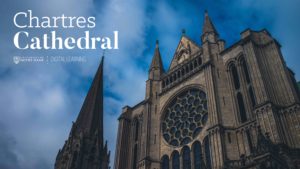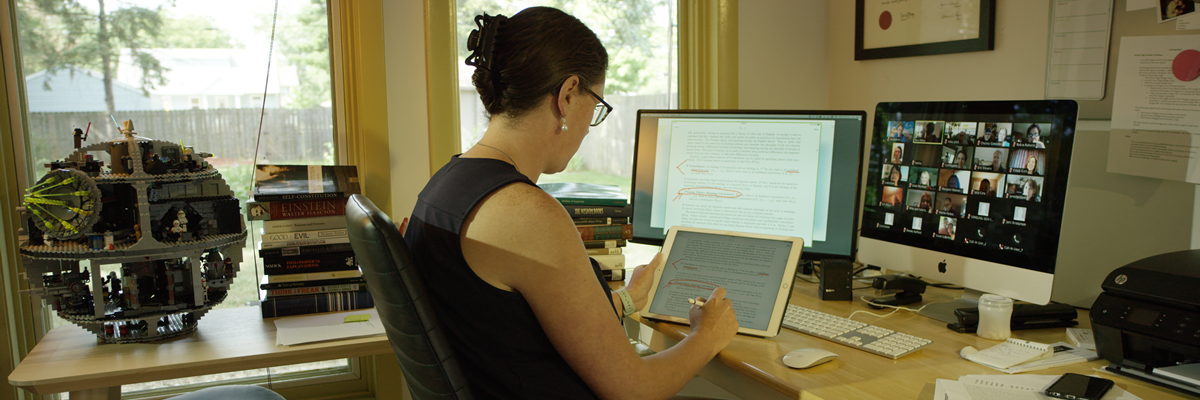 Spring, 2017, Professor Dan Hobbins submitted a proposal for support to the Office of Digital Learning (ODL) under the Digital Learning Initiatives RFP process. The project focused on his “Western Civilization: Antiquity to 1500” course, a demanding course in which students create presentations which cover entire civilizations in a single lecture. To help students with this task, Hobbins began making “vacation videos” several years ago to enhance student learning. The videos were made available to students in Sakai, but not required viewing. Students enthused about the videos, which many described as their “favorite part of [the] course,” but viewership inevitably dwindled as the requirements for Hobbins’ and others’ courses intensified as the semester progressed.
Spring, 2017, Professor Dan Hobbins submitted a proposal for support to the Office of Digital Learning (ODL) under the Digital Learning Initiatives RFP process. The project focused on his “Western Civilization: Antiquity to 1500” course, a demanding course in which students create presentations which cover entire civilizations in a single lecture. To help students with this task, Hobbins began making “vacation videos” several years ago to enhance student learning. The videos were made available to students in Sakai, but not required viewing. Students enthused about the videos, which many described as their “favorite part of [the] course,” but viewership inevitably dwindled as the requirements for Hobbins’ and others’ courses intensified as the semester progressed.
After receiving approval from the Provost’s Committee on Learning and Teaching, Hobbins began work with the ODL’s Learning Design Team to ensure that Hobbins’ media assets aligned with his pedagogical vision, were informed by instructional cinematography, and were informed by research from the sciences of learning. The ODL designers worked with Hobbins to reframe the organizing principles of the course, first identifying an original topic/geographic location—the Chartres Cathedral—before expanding this design to the entire course. This encouraged Hobbins to be more creative in his thinking and more courageous in what he was willing to try. The course was reshaped to include:
- Learner-centered design—Reconceiving the project from the perspective of the the learners.
- Learner-directed navigation—Giving students greater control of their learning and learning paths. This was done by deconstructing Professor Hobbins’ tour of the Cathedral and allowing students to determine their own path through the content.
- Scaffolded design—The depth of exploration was left to users, based on the importance of the content. Students engaged first with Hobbins’ video pieces, engaging supplemental information as they navigated more deeply into the content.
- Consistent and increased engagement—to achieve full participation in the course content of the videos, we created required assignments that draw conclusions from the students about their experiences – these metacognitive reflections were also springboards into the next face-to-face class meeting.
As professor Hobbins works through the first cohort of students under the new curriculum, this semester, he had this so say about his experience working with the Office of Digital Learning:
Your overall impressions of working with the ODL?
I can’t tell you how impressed I am with the high production quality of everything, the video, the editing, the exercises, the software interface, all of it. The bits of the light show at the beginning of each video really add a wow factor. I’m sure the students will enjoy it all, and learn from it. I wanted to thank each of you for the energy you put into the project, and for the passion you brought to it. I feel deeply privileged to have been given this special opportunity.
How are these videos being used?
The videos allow us to make better use of class time by having the students watch the videos on their own time. They also write a closing reflection on the videos, which they upload to Sakai. I read those before class and then I structure our class discussion based on their reflections. As for course content, the video unit illustrates one of the pivotal historical moments of period being covered, which is the transition to a period of intense growth from early to high medieval Europe. Chartres cathedral is a fitting symbol of this growth. It illustrates better than any other monument the complexity of this growth — economic but also religious and intellectual.
Tell us about you experience shooting/working with the ODL?
This was my first experience with ODL. I came in with a vague idea of what I wanted to do — basically improve the videos that I’d been making for my course on the history of Western Civilization. ODL helped me to clarify my goals and to integrate these videos more organically into the course content.
How have the materials you produced with the ODL enhanced your course?
These videos allow me to use class-time in a more efficient way by moving some of the basic content outside of class. The students watch these on their own, and I can then be more creative about how to use class time — in particular having a discussion in class time as opposed to lecturing, so making this a more dynamic experience. The students are getting an immersive experience into a World Heritage Site. It’s perhaps only a slight exaggeration to say that this is better than visiting the site itself. A visit would let them tour the building without necessarily understanding it. Here they’re getting to see how a historian uses this building as a document to understand the past.
httpvh://youtu.be/bfFv_1McUNw
